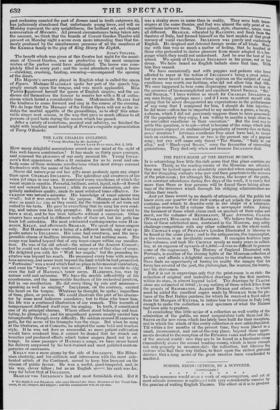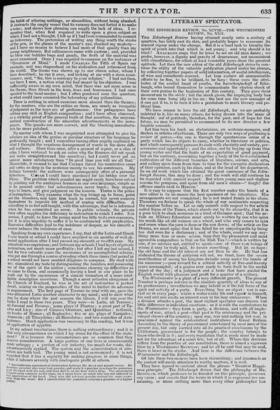SCHOOL RECOLLECTIONS, BY A SUFFERER.
(coiccixi,gn.)
* * * * * * * To teach nonsense would seem a work of supererogation, and yet at most schools nonsense is cultivated with very considerable success by the practice of writing English Themes. The effect of it is to produce the habit of uttering nothings, or absurdities, without being abashed. It instructs the empty vessel that its vacancy does not forbid it to make a noise; and shows how phrasing can supply the lack of ideas. I re- member that, when first required to write upon a given subject on which I had not a thought, I felt as if I had been commanded to commit an indecency. The pretension of writing any thing worth the stroke of the pen, or the glance of the master's eye, shocked my modesty— and I have no reason to believe I had more of that quality than my young neighbours. But callousness came with custom ; and, provided we blew our bubbles huge and gaudy, the froth of the material was never examined. Once I was required to compose on the instances of "Greatness of Mind." I made CHARLES the Fifth of Spain my example, and was rhapsodical on his abdication and retirement from the world. The theme was shown up to our clown usher, whom I have described; he ran it over, and looking at me with a stern coun- tenance, said, " Sir, this is contrary to your religion." I had not then, nor have I now, a notion what the fool meant by his objection. I was sufficiently aware in my own mind, that there was not more sense in the theme, than Greek in the kais, kous, and bomenoses, I had once spouted to the heal-master ; but I often pondered over the question, in what could have consisted the heterodoxy of my galimathias.
There is nothing in school exercises more absurd than the themes ; for the masters, who are the critics on them, are nearly as incapable ofjudgment as the boys are of performance. Our pedagogues have seldom any skill in English composition ; and I have often observed, as a striking proof of the general truth of that assertion, the ungram- matical construction of the education advertisements in the news- papers. The quacks are more correct, and the blacking-manufactu- rers far more polished.
No master with whom I was acquainted ever attempted to give his scholars an idea of the genius or peculiar structure of the language he professedly taught ; and I remember having often angrily cogitated on what I thought the vexatious derangement of words in the more diffi- cult authors. More than once, after a present of a-pear, or a slice of cake, I have ventured to ask an usher why the Romans did not speak and write straightforward like ourselves • but I could never get an answer more satisfactory than " In good lime you will see all''that." Meanwhile, it seemed to me that CICERO thrust his nominative cases and verbs so deep in the sentence merely to vex his construers. My feelings towards the authors were consequently often of a personal bitterness. Cis Alt I could have murdered for his bridge over the Rhine. The problem which puzzled me might easily have been solved by pointing out the analogous licences in our own language, simple as is its general order: but schoolmasters never teach; they require boys to learn, and give judgment on the lessons. Theirs is the police of instruction. They examine what the boy brings up to them, point out the blunders, and turn him back to correct, but never concern themselves 'to iniproVe-hia method of coping with difficulties. A schoolboy is in fact self-taught, with this advantage, thathe is informed when he has committed an error. In public schools, the private tutor often supplies the deficiency in instruction to which I refer. It is unwise, I grant, to leave the young mind too little to its own resources, but it is also impolitic to suffer it to be confounded with perplexities. Excessive difficulties lead to the indolence of despair, as too smooth a course induces the indolence of ease.
Speaking from my own experience, I say, that all the Latin and Greek I ever learnt at school I could have acquired in six months of well-di- rected application after I had passed my eleventh or twelfth year.' My education was capricious ; and between my schools I had layers of private instruction, not much more profitable ; but after I left my last school, I had for two valuable years the assistance of an accomplished scholar, who put me through a course of reading which three times that period in a school would not have enabled diligence to compass. He read with me; stimulated my taste by distinguishing the beauties, and possessing me of the spirit of the author ; sometimes clearing up difficulties as we came to them, and occasionally leaving a knot in one place to be made out by the occurrence of a similar formation of a more intel- ligible description elsewhere. Though a most orthodox clergyman of the Church of England, he was in the art of instruction a perfect Jesuit, seizing on the propensities of the mind to further its advances in acquirement. The first page of Terence he read with me, gave the once-abhorred Latin another character to my mind ; and to show what may be done where the zest seasons the labour, I will run over the books I read in those two years. They were—in Latin, all Terence ; all Juvenal and Perseus ; some plays of Plautus ; a great part of Ta- citus and Livy ; also of Cicero's Orations, and Quintilian : in Greek, six books of Homer ; all Sophocles ; five or six plays of Euripides ; Anacreon ; all Thucydides ; all Herodotus ; and two comedies of Aris- tophanes. Much application was necessary to this reading, but it was an application of appetite. In my school recollections there is nothing extraordinary ; and it is that very circumstance on which I lay stress for the effect of the state- ment.* It is because the circumstances are so common that they deserve consideration. A large portion of our lives is unnecessarily made unhappy ; a portion of our industry, too much for waste, dis- advantageously applied. The system and the administration of edu- cation are both bad. The young mind is not economized ; it is not regarded that it has a capacity for making progress in some things, while it labours severely with inadequate profit at others.
* One ludicrous agreement of observation between 'Mr. BEST and myself occurs. He describes an usher who wore hair-powder, and made it a pastime to scrape the pomatum from his head with his nail, and then flirt it on the floor with a fillip. The amusement I should infer common to the class, for I never knew an usher who was not addicted to that application of the head. They who did not wear powder derived the same recre- ation from the scurf. But I should think the pomatura-scraping a pleasure of a higher



















 Previous page
Previous page